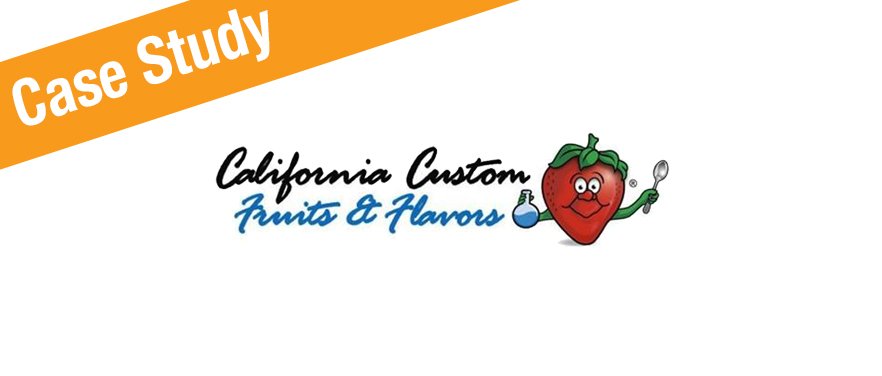When it comes to a good ERP experience, it’s all about intuitiveness and flexibility, according to this food manufacturing company. The cost of managing their customized software was outweighing its benefits, so the company took action to invest in a strong future for the company. This is California Custom Fruits and Flavors’ story.
THE COMPANY
California Custom Fruits and Flavors, Inc. (CCFF) is a global supplier of customized fruit and flavor ingredients for the dairy, bakery, beverage and food service industries. Since its inception in 1986 CCFF has grown steadily by focusing on innovative flavor engineering and production as well as an unwavering emphasis on quality and customer service.
THE CHALLENGE
When CFO, Jim Fragnoli, joined California Custom Fruits and Flavors (CCFF), he was tasked with identifying a new ERP strategy – whether it was to continue investing in the existing system or implementing an entirely new one. It didn’t take long for him to determine that the highly customized ERP solution in place was incapable of keeping up with the company’s development.
“It quickly became clear to us that we needed to start evaluating ERP options,” Fragnoli stated. “There were a number of functions that the [existing] system could not handle and our customization costs were becoming a significant burden on the growth of the business.”
After analyzing their business model, CCFF came to the conclusion that their biggest functional needs for a new system centered on formula management, inventory tracking, and financial reporting.
THE SELECTION
CCFF evaluated four different software systems that met the basic functional needs of their business. They chose DEACOM, largely because of the platform’s intuitiveness and development philosophy, which is rooted in simplicity and evolution. The configurable solution provided CCFF with the flexibility to scale and adapt to evolving regulations quickly – critical business issues that previously challenged CCFF operations.
By keeping all functionality as part of the main ERP system and not 3rd party bolt-ons, DEACOM is able to offer native functionality not found in the other core ERP systems. Such capabilities specifically attractive to CCFF include formula revision tracking, inventory control, job scheduling, demand planning, cost comparison tools, MRP, and flexible report generation tools.
“One of the things I have learned over the years is to never modify software,” said Fragnoli. “Deacom’s enhancements over customizations is one of the biggest selling points for us and I think it is extremely smart.”
THE RESULTS
CCFF worked with Deacom’s experienced implementation team to configure the software to their unique business requirements and was live in eight months.
Fragnoli noted the biggest improvements to be their warehouse and production operations: “DEACOM has helped us create a significantly more efficient business. It is because of this that we were able to eliminate Saturday production schedules and still keep up with demand.”
The software’s single-system architecture is able to deliver optimal performance and impressive drill-down capabilities across each business area. CCFF has experienced this most prominently in inventory management where they have gained detailed insight into exactly where everything is located and how much is available. They have also started using new methods to drive leaner manufacturing operations including FIFO (First In, First Out), FEFO (First Expired, First Out), and the native Materials Requirements Planning (MRP) system. This data is accessible in real-time to all impacted departments including purchasing, accounting, and production.
“Most MRP systems run 3-4 hours, or even longer,” said Fragnoli. “With DEACOM, it is just 2-3 minutes. The speed and accessibility to detailed data is so quick because of the single-source database. You don’t get that with other ERP systems.”
This structure has also enabled the food manufacturing company to view and revise all formulas every step of the way, and at a level previously unachievable. Now, formula changes are instantly reflected in inventory, production requirements, and planning tools.
“Deacom is far more responsive than other ERP providers. We would be 3-4 years behind the times if we had gone a different ERP route. I am convinced of that,” said Fragnoli.
Visit our website for more information about how Deacom’s Food ERP software can help drive efficiencies for food manufacturing companies.

